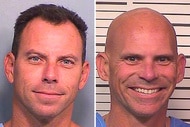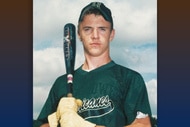Create a free profile to get unlimited access to exclusive videos, breaking news, sweepstakes, and more!
Federal Judge Approves Delay In Rhode Island Man's 'Murder On The High Seas' Trial
Federal prosecutors and lawyers representing Nathan Carman, who is accused of murdering his mother, Linda Carman, during a sailing trip in New England, requested more time in the "unusual and complex" case.

The trial of a man accused of killing his mother at sea in an alleged attempt to inherit millions will be delayed.
Lawyers for Nathan Carman, 28, as well as prosecutors asked on Aug. 11 that proceedings in his murder trial be postponed until September for both sides to continue to build their cases, according to court documents reviewed by Oxygen.com.
Carman was charged in May for the murder of his mother, Linda Carman, on Sept. 17, 2016. That day, the pair set off from a Rhode Island marina for what was supposed to be a fishing venture on their boat, Chicken Pox. The pair didn’t return the following day, as planned, and Carman was rescued from a life raft near Martha’s Vineyard, Massachusetts one week later.
Neither Linda Carman nor the boat was ever recovered.
Following a years-long investigation, Carman was arrested after an eight-count indictment was returned by a federal grand jury. He is accused of intentionally killing his mother off the Long Island, New York coast in a scheme to inherit his mother’s $7 million fortune, which Linda herself inherited after the 2013 murder of her father, 87-year-old John Chakalos.
Chakalos was shot to death while sleeping in his Windsor, Connecticut home — a murder that remains unsolved. Despite Nathan Carman being a suspect in his grandfather’s shooting, he has not been charged.
U.S. Attorney Nikolas P. Kerest for the District of Vermont and the Office of the Federal Public Defender filed the joint motion to delay just one day before pre-trial motions were scheduled to begin.
Parties from both sides claimed moving the trial would be necessary “because the ends of justice would be best served by excluding” the time afforded by the Speedy Trial Act.
The Sixth Amendment clause would normally ensure that Carman would be tried within 70 days of his indictment being unsealed (which, in Carman’s case, was on May 2). Lawyers pointed out, however, that flexibility could be exercised, claiming Carman’s case was “unusual and complex” for several reasons.
First, they said the evidence in the case was extensive, pointing to Carman’s fraud charges dating back to 2013, the same year his grandfather was murdered in his home. Parties referenced two “related” civil cases that involved “voluminous discovery as well as numerous depositions.” One of these cases, lawyers stated, had gone to trial.
“These prior, related proceedings add substantial complexity to the instant case,” the motion stated.
The recent filing didn’t specify more about the civil cases but, in 2017, Carman and his insurers sued one another after the insurers rejected his $85,000 claim for the loss of the boat on which his mother allegedly died, according to NBC New England affiliate NECN. The insurers accused Carman of making “suspicious alterations” to the sunken vessel, per a 2017 report by the Hartford Courant. That case went to trial.
“Additionally, the case [that went to trial] also involved evidence from at least four different states,” according to the recent motion.
Separately, a New Hampshire judge dismissed a probate case in 2019, according to the Associated Press. Carman’s maternal aunts — also beneficiaries of their father’s fortune — filed a lawsuit against Carman, attempting to bar him from inheriting his mother’s portion of their father’s near $30 million inheritance.
The judge dismissed that suit over a discrepancy in Chakalos’s legal state of residence.
Lawyers also sought more time due to the large number of expert witnesses expected to testify in “atypical areas.”
“For instance, the government anticipates calling experts to testify in the areas of ocean drift analysis, naval architecture and wilderness medicine, among others,” the motion stated.
Chief U.S. District Judge Geoffrey W. Crawford for the District of Vermont approved the request on Tuesday, court records show. Crawford agreed with petitioners that a failure to grant the proposal would likely "make a continuation of [the trial] impossible, or result in a miscarriage of justice.”
A status conference has been scheduled for Sept. 30.























